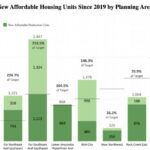By Washington Post, December 17, 2024
When prospective home buyers come up empty-handed, seeing a “sold” sign on an ideal home that never showed up during their search rubs salt into the wound.
What’s frustrating to so many is these nonpublic sales, often known as off-market listings, shortcut the transparency that’s meant to inform the buying and selling process: Every home that’s listed by a real estate agent and marketed to the public is supposed to be visible through one of the hundreds of databases known as Multiple Listing Services (MLS).
Now, an internal battle is heating up between real estate brokerages over off-market listings — just as the dust is starting to settle on commission rule changes triggered by lawsuits against brokerages and the National Association of Realtors (NAR).
Unlike the commission overhaul, which pitted home sellers against real estate giants, this fight resembles a clash of titans more than a rematch of Harry Potter vs. Lord Voldemort. And the eventual outcome could result in more off-market sales at a time when buyers are already slammed by housing scarcity and high prices.
At stake is an NAR rule enacted in 2019, known as the “Clear Cooperation Policy” (CCP), that requires agents to list a property on their MLS within one business day after marketing it to the public.
Under an off-market listing (also known more pejoratively as a pocket listing), an agent markets the property before putting it on the MLS — using back channels to expedite the deal between private parties. This tactic is allowed under the CCP as long as the homes are marketed privately among agents within a brokerage or individually to specific potential buyers.
Now, a brokerage giant, Compass, wants to repeal this rule altogether — in effect, opening a bigger window for off-market listings — because it allegedly forces the release of too much information that hurts sellers.
“Using MLS data … real estate websites have built their business models at the expense of homeowners by showing negative insights on their listings, such as days on market, price drops and home value estimates,” said Robert Reffkin, CEO of Compass. “The CCP removes a seller’s right to choose how to market their home to meet their individual needs.”
But other brokerages are fighting to keep the rule, at least in modified form, arguing that it enhances transparency and choice. Some also claim it’s effectively a power grab by Compass.
The repeal argument “is just one company’s cynical effort to achieve profitability by convincing American homeowners to do something that’s demonstrably against their interest,” said Leo Pareja, Miami-based CEO of eXp Realty, a brokerage operating in 24 countries.
Anywhere Real Estate Inc. — the parent company of Coldwell Banker Realty, Century 21, Sotheby’s International Realty, Corcoran and more — also favors keeping the rule but would be open to having it overhauled.
The debate has become heated enough that the NAR took up the issue in an advisory committee, which in turn passed the question on to the association’s leadership. While the rule remains in effect, the NAR told The Post that it’s “continuing to evaluate the policy — a final decision has not yet been made.” Still, many agents and brokerages continue to market their access to off-market listings as part of their value proposition.
The fight is expected to further escalate because the changes in commission rules will probably cut into agent and broker earnings. To offset that drop, larger brokerages have an interest in keeping their listings in-house and minimizing agent competition, which effectively keeps commission rates higher, said Glenn Kelman, Seattle-based CEO of Redfin.
“I have a hard time with brokers getting on their high horse about how this is [about] freedom and the American flag and apple pie,” said Kelman. “It’s the oldest game in business, which is trying to play a game of monopoly.”
The price of exclusivity
Agents don’t have to join an MLS, but most do because it lets them share data across all companies. And for an MLS to function, agents must share all their listings, not just some, notes Victor Lund, managing partner with WAV Group, a real estate consulting firm based in Laguna Beach, California.
“Anyone who holds back a listing hurts buyers,” Lund said. “All listings should be on the MLS because partial participation dulls the sharp accuracy of data about available inventory and recent comparable sales that have a bearing on the market.”
The genesis of the CCP goes back to the 2010s, when top agents — particularly in the luxury market — created their own networks to share exclusive listings. These properties could be marketed to agents within a brokerage and privately to individual potential buyers, but not on public websites.
“A lot [of these agents] work for the same brokerage, so there’s a financial incentive if the buyer’s agent and the listing agent work for the same company since they can double-end the commission,” said James Dwiggins, San Francisco-based CEO of NextHome.
As many as 10 or 15 percent of homes were sold off-market before the CCP rule was crafted as a response, Lund estimates. But once in effect, its broader intent seems to have worked. While off-market listings are hard to track, Bright MLS estimates that less than 5 percent of listings in its service area throughout the Mid-Atlantic region now are private.
For most sellers, the rule’s enhanced transparency helps. They want to sell their home for the highest price as fast as possible and with the least amount of friction, which means being visible to the largest number of buyers, Kelman said. And most research shows that homes listed on the MLS sell for more than off-market listings. For example, one study from Bright MLS showed that MLS-listed homes sold for an average of 17.5 percent more than off-MLS sales between 2019 and the first quarter of 2023.
But a more exclusive niche of sellers — like celebrities and the ultra-wealthy, or public figures seeking a low profile — see benefits to privacy. These are the ones who are most likely to take advantage of the off-market loophole in the rule to skirt around public marketing. In addition, some MLS systems give sellers the option to list without photos, or information on the price or open houses, Kelman said.
Potential losers
Along with the benefits of market competition, backers of the rule point to fair-housing principles.
“The whole point of creating an open marketplace is so that anyone, regardless of gender, race, age or any other protected class, can see everything that is for sale,” Dwiggins said. But under off-market listings, “agents try to sell them inside their office.”
“So if a buyer isn’t working with an agent in that office, they won’t even know the property was for sale,” he added. “That’s exclusionary by definition.”
The essence of the CCP rule and fair-housing laws is to make sure that everyone can see all homes for sale, agreed Kelman.
“Selling a house is not the same as another commodity like a candy bar or a couch,” Kelman said. “Housing shapes generational wealth and educational opportunities. You need a free and open market for housing because the stakes are so high.”
More broadly, many real estate professionals worry that repealing the rule will make it harder for sellers and agents to collect key market data.
A repeal is “a disadvantage for both sellers and buyers,” said Ryan Schneider, the Madison, New Jersey-based CEO of Anywhere, in a third quarter earnings call in early November. “Buyers get the lack of transparency of their current listing inventory, and over the long run, sellers will have less info of what’s happening in their market.”
Another risk to sellers, in Dwiggins’s view, is that they might get spun by their brokerage: An agent may encourage an off-market listing by telling their client the commission will be reduced if the same brokerage represents both sides, and that the home will be sold quickly and with less foot traffic because the agent already knows of an interested buyer or two. What that agent may not make clear to sellers is that they might net less money on the sale if they’re not fully exposed to the open market, Dwiggins said.
Potential winners
To Compass’s Reffkin, by contrast, scrapping the rule will help sellers by letting them market their home as home builders and real estate developers do. For example, they could use “premarketing and multi-phased marketing that protects their listings from the potential risks of MLS exposure that include accumulation of days on market and public price history,” he said.
Advertisement
“By forcing home sellers into a system of negative insights like days on the market and price history, the CCP creates a ‘risk to list’ that discourages home sellers from publicly listing their homes,” he argued. Lift the rule, and sellers will have more ways to market their homes and increase inventory, he added.
Pareja of eXp doesn’t buy that argument — and believes a repeal would diminish the transparency of the U.S. market, which compares favorably to other countries.
“Our overseas agents complain that they need to go to 10 websites to get an idea of what’s for sale,” Pareja said. “When I helped my parents sell a home in Belize, it took about five years because of the difficulty getting it in front of buyers.”
Still, Compass’s push to scrap the rule may be joined by other major real estate players over time if more of them see an upside in keeping listings in-house, Lund said. That would also diminish the role of online companies such as Redfin, Zillow and Realtor.com, which could lose business if they no longer have access to most listings.
“Repealing the CCP is going to advantage the large brokers, including some who are [now] advocating for repeal,” said Schneider of Anywhere. “We have more listings than anybody does, so if this thing gets repealed, we could be the biggest beneficiary — even if we don’t think that’s the right answer.”
Click here to read full article







